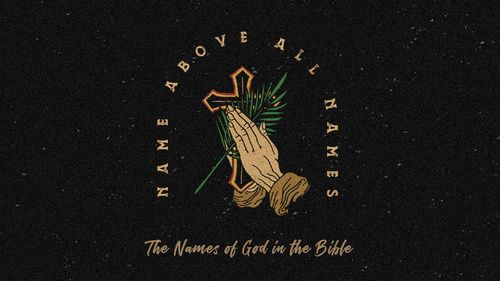Jehovah / YHWH (Presence)

The most common name for God in the Bible is his personal name, YHWH. Modern spellings of this name include Yahweh and Jehovah (more on that later). Although this name is used over 6,500 times in the Old Testament, we’re not actually sure how it was originally pronounced. There’s two reasons for that: first, the original manuscripts of the Old Testament don’t contain any vowels, and second, the Jewish people stopped saying this name out loud for fear of accidentally taking the Lord’s name in vain.
Can I Buy a Vowel? Unfortunately, No…
You’ll notice that YHWH is spelled without vowels, and there’s a good reason for that. If you were to look at an ancient Biblical manuscript of the Old Testament (like the Dead Sea Scrolls), all you would see are consonants from the Hebrew alphabet. The vowel sounds—which were added later in order to help facilitate oral reading—are typically placed underneath the Hebrew consonants. What’s sometimes rather surprising to English speakers is that Hebrew vowels aren’t really letters at all; they’re more like small dots or lines that indicate which vowel sounds to make. This is all very different than the way English works!
God’s personal name in the Old Testament consists of four Hebrew consonants: You, Heh, Waw and Heh, or YHWH using English letters. The missing vowels make it impossible to know for sure how this name was originally pronounced. Usually there was enough of an oral tradition of how a word was pronounced and preserved throughout history to know the pronunciation, but not with YHWH.
Taking the Lord’s Name in Vain
Originally, the name YHWH was spoken out loud any time Jewish readers came to it in the Scriptures without any second thoughts. But as time went on, the people came to believe that mispronouncing the personal name of the Lord—even unintentionally—was tantamount to taking the Lord’s name in vain. As such, they stopped pronouncing YHWH altogether, and began substituting a more generic term for God (Elohim, “The Name,” or Adonai, which comes next in our series) anytime they came to YHWH in the Bible. With that substitution, the proper pronunciation was lost to history.
Without the vowels or an oral history to guide us, we’re just not sure how to pronounce YHWH. It would somewhat like seeing B-R-N and needing to guess how to pronounce it Is it Brain? Bryan? Boron? Baron? Byron? Without the vowels you really wouldn’t be able to tell.
The History of “Yahweh” and “Jehovah”
So if we don’t know how to pronounce YHWH, why do we use the name Yahweh? The explanation is actually pretty interesting. The third major name for God in the Bible is Adonai (which means Lord). If you take the vowels from Adonai (a-o-a) and insert them in-between the consonants of YHWH, you get YaHoWaH. When Hebrew is passed through Latin, the Y turns into a J and the W turns into a V, giving us JaHoVaH. From there, it is further anglicized into Jehovah or Yahweh.
Finding YHWH In Your Bible
Most Bible translations do not print YHWH or Yahweh. Instead, they typically translate this name as “the LORD” (notice the capital letters). Since there are multiple words for “Lord” in the Bible, some of which apply to humans (i.e. masters) instead of God himself, Bible translators needed something to differentiate between YHWH (“the LORD”) and the more common word for “lord.”
YHWH Is the Personal God.
God first reveals his personal name to Moses during the burning bush scene in Exodus 3. Moses is apprehensive about delivering his message to Pharaoh (let my people go!), and needs to know the name of the God who was sending him. God’s response is to reveal his personal, divine name YHWH. This name is likely derived from the Hebrew verb “to be,” and brings to mind the idea of eternal, unchanging existence. Perhaps we can hear God saying, “I am who I am, I will be who I will be, and nothing will change that!”
Moses would go on to write much of the first five books of the Old Testament. After hearing God’s personal name, he included it in earlier parts of Israel’s story to indicate that this same God was personally involved in the lives of his people all along, even if he hadn’t revealed his personal name to the Patriarchs of Israel.
If Elohim brings to mind God’s creative power, YHWH brings to mind his personal interactions. And that’s precisely what we see the first time YHWH is used (Genesis 2:4). In Genesis 2, God creates the first man and woman. He is directly, intimately involved in the story. He is not a distant God who does everything from afar, or a generic deity who made the world and then left it to its own devices. Instead, he is here, with us, intervening our lives in undeniable ways.
Consider the ways YHWH takes direct action in Gen. 2:
If Elohim is about God’s power, then YHWH is about God’s presence. Tony Evans writes about the significance of keeping both of these concepts in mind as we reflect on the nature of God:
Can I Buy a Vowel? Unfortunately, No…
You’ll notice that YHWH is spelled without vowels, and there’s a good reason for that. If you were to look at an ancient Biblical manuscript of the Old Testament (like the Dead Sea Scrolls), all you would see are consonants from the Hebrew alphabet. The vowel sounds—which were added later in order to help facilitate oral reading—are typically placed underneath the Hebrew consonants. What’s sometimes rather surprising to English speakers is that Hebrew vowels aren’t really letters at all; they’re more like small dots or lines that indicate which vowel sounds to make. This is all very different than the way English works!
God’s personal name in the Old Testament consists of four Hebrew consonants: You, Heh, Waw and Heh, or YHWH using English letters. The missing vowels make it impossible to know for sure how this name was originally pronounced. Usually there was enough of an oral tradition of how a word was pronounced and preserved throughout history to know the pronunciation, but not with YHWH.
Taking the Lord’s Name in Vain
Originally, the name YHWH was spoken out loud any time Jewish readers came to it in the Scriptures without any second thoughts. But as time went on, the people came to believe that mispronouncing the personal name of the Lord—even unintentionally—was tantamount to taking the Lord’s name in vain. As such, they stopped pronouncing YHWH altogether, and began substituting a more generic term for God (Elohim, “The Name,” or Adonai, which comes next in our series) anytime they came to YHWH in the Bible. With that substitution, the proper pronunciation was lost to history.
Without the vowels or an oral history to guide us, we’re just not sure how to pronounce YHWH. It would somewhat like seeing B-R-N and needing to guess how to pronounce it Is it Brain? Bryan? Boron? Baron? Byron? Without the vowels you really wouldn’t be able to tell.
The History of “Yahweh” and “Jehovah”
So if we don’t know how to pronounce YHWH, why do we use the name Yahweh? The explanation is actually pretty interesting. The third major name for God in the Bible is Adonai (which means Lord). If you take the vowels from Adonai (a-o-a) and insert them in-between the consonants of YHWH, you get YaHoWaH. When Hebrew is passed through Latin, the Y turns into a J and the W turns into a V, giving us JaHoVaH. From there, it is further anglicized into Jehovah or Yahweh.
Finding YHWH In Your Bible
Most Bible translations do not print YHWH or Yahweh. Instead, they typically translate this name as “the LORD” (notice the capital letters). Since there are multiple words for “Lord” in the Bible, some of which apply to humans (i.e. masters) instead of God himself, Bible translators needed something to differentiate between YHWH (“the LORD”) and the more common word for “lord.”
YHWH Is the Personal God.
God first reveals his personal name to Moses during the burning bush scene in Exodus 3. Moses is apprehensive about delivering his message to Pharaoh (let my people go!), and needs to know the name of the God who was sending him. God’s response is to reveal his personal, divine name YHWH. This name is likely derived from the Hebrew verb “to be,” and brings to mind the idea of eternal, unchanging existence. Perhaps we can hear God saying, “I am who I am, I will be who I will be, and nothing will change that!”
Moses would go on to write much of the first five books of the Old Testament. After hearing God’s personal name, he included it in earlier parts of Israel’s story to indicate that this same God was personally involved in the lives of his people all along, even if he hadn’t revealed his personal name to the Patriarchs of Israel.
If Elohim brings to mind God’s creative power, YHWH brings to mind his personal interactions. And that’s precisely what we see the first time YHWH is used (Genesis 2:4). In Genesis 2, God creates the first man and woman. He is directly, intimately involved in the story. He is not a distant God who does everything from afar, or a generic deity who made the world and then left it to its own devices. Instead, he is here, with us, intervening our lives in undeniable ways.
Consider the ways YHWH takes direct action in Gen. 2:
- Made the heavens and earth (2:4)
- Formed the man (2:7)
- Planted a garden (2:8)
- Made all kinds of trees grow (2:9)
- Took the man and put him in the Garden (2:15)
- Commanded the man (2:16)
- Made a helper for Adam (2:18)
- Formed the beasts / birds (2:19)
- Caused Adam to fall asleep (2:21)
- Created Eve (2:22)
If Elohim is about God’s power, then YHWH is about God’s presence. Tony Evans writes about the significance of keeping both of these concepts in mind as we reflect on the nature of God:
“If Elohim is God’s creative and powerful name, Jehovah is God’s personal name. It’s the self-revealing name God gave when Moses asked, “What is [Your] name?” When we study the name Elohim, we study the God who is the Creator, and we can talk about His power, presence, and prowess. When we talk about Jehovah, we’re talking about His person, His character. Elohim is the side of God who created the heavens and the earth. Jehovah is the side of God who relates to His creation personally. A person can believe in Elohim without knowing Jehovah. In fact, plenty of people believe in God (Elohim) but don’t know the God in whom they believe (Jehovah). Jehovah is the God who personally reveals Himself to us, often through the trials and struggles we face.” -Tony Evans, The Power of God's Names (p. 45).
